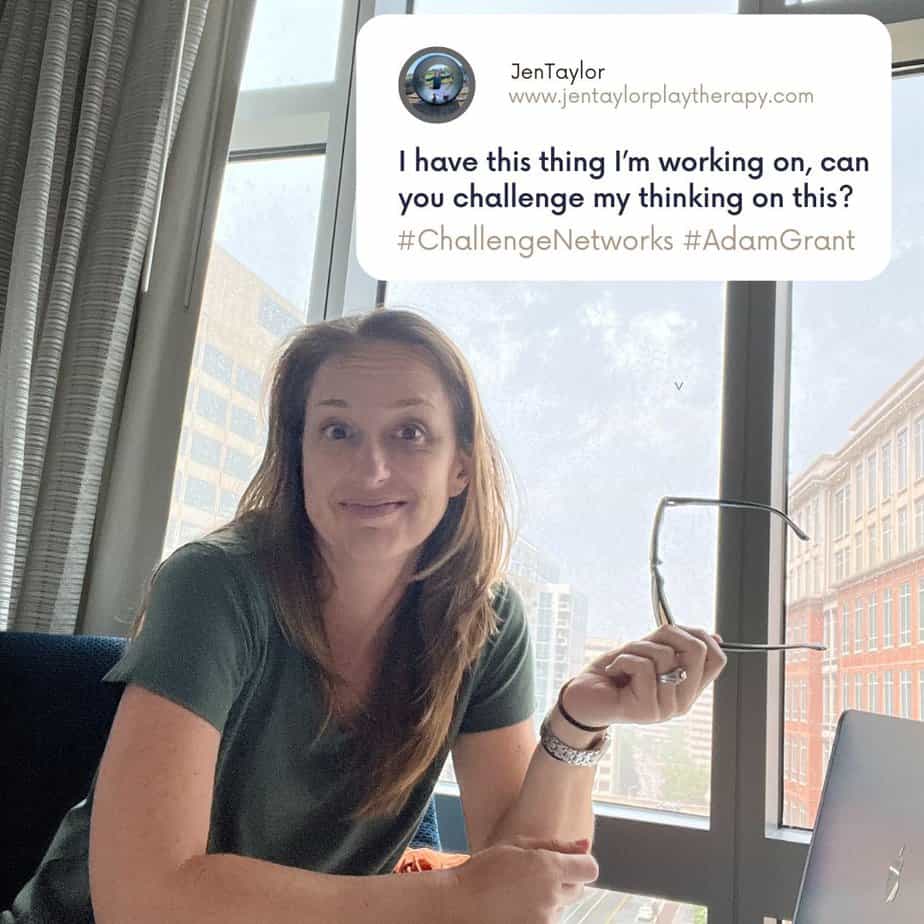If your network doesn’t include these people, you’re missing out: Learn how to create a challenge network and why it matters.
Everyone needs a relentlessly positive cheerleader in their corner reminding them of their greatness and their ability to succeed. Those people are valuable and hopefully we all have at least one of them in our lives. However, what you also need is a group of people that will be your cheerleaders in disguise - people who are actually rooting for you - but are willing to give you necessary criticism so that you are even more likely to succeed.
According to organizational psychologist and Wharton professor, Adam Grant - this second group of people is known as a challenge network. A challenge network is a group of people that you can go to that will push back on your ideas. This is a group of people that you have identified as knowledgeable in a topic area and also willing to provide the type of feedback that will ultimately make your ideas, writing, products, etc better.

I think of your challenge network a little bit like your own personal Shark Tank. On the TV show, Shark Tank - entrepreneurs believe that they have a brilliant idea for a new business product - something that will revolutionize the market and make everyone lots of money. They intentionally put themselves in a position to be criticized and challenged on every aspect of their business plan by four highly respected and successful entrepreneurs like Mark Cuban, Lori Greiner, Barbara Corcoran and Daymond John.
In this case, if you can overcome the challenge networks’ concerns, you might end up with a deal to work with them. If not, you are sent home to re-think your strategies and plans and hopefully make them better. The Shark Tank can be pretty brutal, but ultimately, the result is that it makes you better.
What qualities does your challenge network need to have?
According to Grant, the people in your challenge network need to be critical, skeptical and challenging.
Grant calls these people “disagreeable givers” and he says they are the most important (and often most undervalued) person in any organization or group. This concept of disagreeable givers was introduced in Grant’s book Give and Take: A revolutionary approach to success.
Disagreeable givers are the people who, on the surface, are rough and tough, but ultimately have others' best interests at heart," Grant said. "They are the people who are willing to give you the critical feedback that you don't want to hear--but you need to hear.
If you really want your challenge network to be effective, you have to prove to them that you can handle their criticism. When they challenge your ideas, Grant says to “Argue like I’m right but listen like I’m wrong.”
He explains that you are not simply to debate your challenge network. You are listening to every part of their feedback and taking in the information and the validity of their feedback. You are looking for ways to communicate your ideas more effectively to respond to the concerns of the challenge network. You are asking them to enter into an intellectual conversation and you are using their knowledge and feedback to expand your own thinking - to take IN information and ultimately, expand your own knowledge.
Your challenge network is going to point out the flaws in your logic, the holes in your research, or the assumptions you are making about the anticipated results or consequences. They are cheerleaders in disguise because they are taking on the role of the critics that you will encounter after you launch your big idea. In this way, they are trying to help you get ahead of the potential negative feedback.
Using your challenge network will make you better, stronger, and more effective.
Who is NOT in your challenge network?
Note - your challenge network is NOT the strangers on social media blasting you with negative comments. Your challenge network is not the people who write bad reviews of your book, your presentation, or your article. (Those people serve a different purpose, which is for another article).
The difference between the critics and your challenge network is that the critics a) may not be people that you know b) they might not have any expertise on the subject and c) they might not be trying to help you grow.
Your challenge network is made of people that you have selected based on your belief that they care about your success, have expertise or a perspective that might be helpful, and are willing to offer constructive criticism about how you can improve.
Grant describes these “disagreeable givers” in your challenge network as people who have “radical candor.” Radical candor is a term from Kim Scott which identifies people who are direct in what they say but warm in their delivery. You know who these people are in your life. You may not always like what they have to say, but their feedback is meaningful to you.
Your challenge network believes in your potential, has high expectations for your success and is confident that you can reach your goals.
It is also important to note that these people don’t have to all be “shark tank status” as far as their knowledge level or status. Sometimes, the most helpful people in your challenge network are people with less experience than you - a concept known as “reverse mentoring.”
Consider having people outside of your discipline as well. People who don’t know that much about your topic can be helpful in telling you where you need to simplify or explain terms that seem obvious to you but are not obvious to everyone else. Even children can be part of the challenge network. Children often have the most innocent but direct “radical candor” because they will tell you the truth based on how they see the world.
Remember that YOU are also part of someone else’s challenge network. Think about times that you have been “disagreeable” with people that you really care about so that they become even better. This is an incredible gift that you can offer to people. But make sure that they have accepted you in this role. You might say, “Can I challenge you on this for just a minute because I believe in you and want to see you reach your goals?” Without this context, people might not see the “giver” and only perceive you as disagreeable.Make your challenge network official!


0 comments